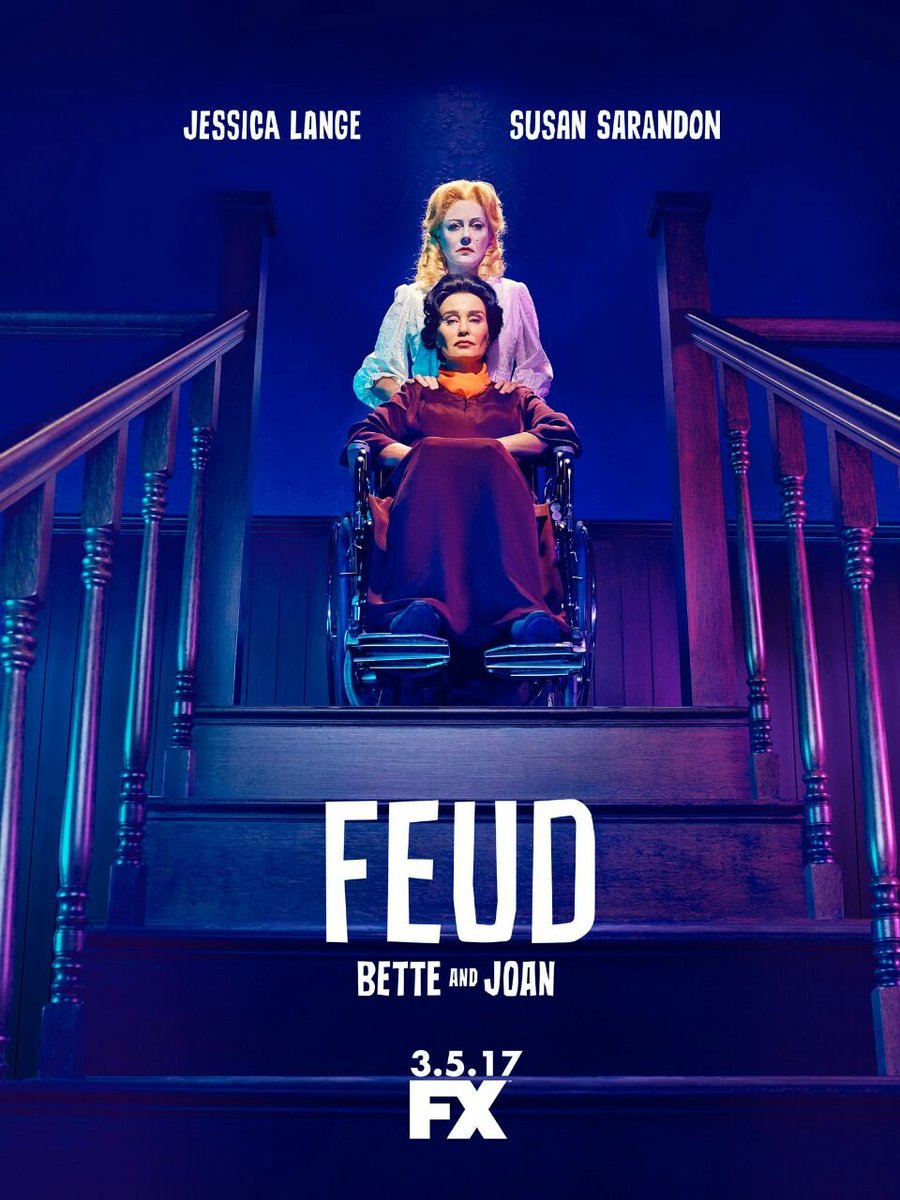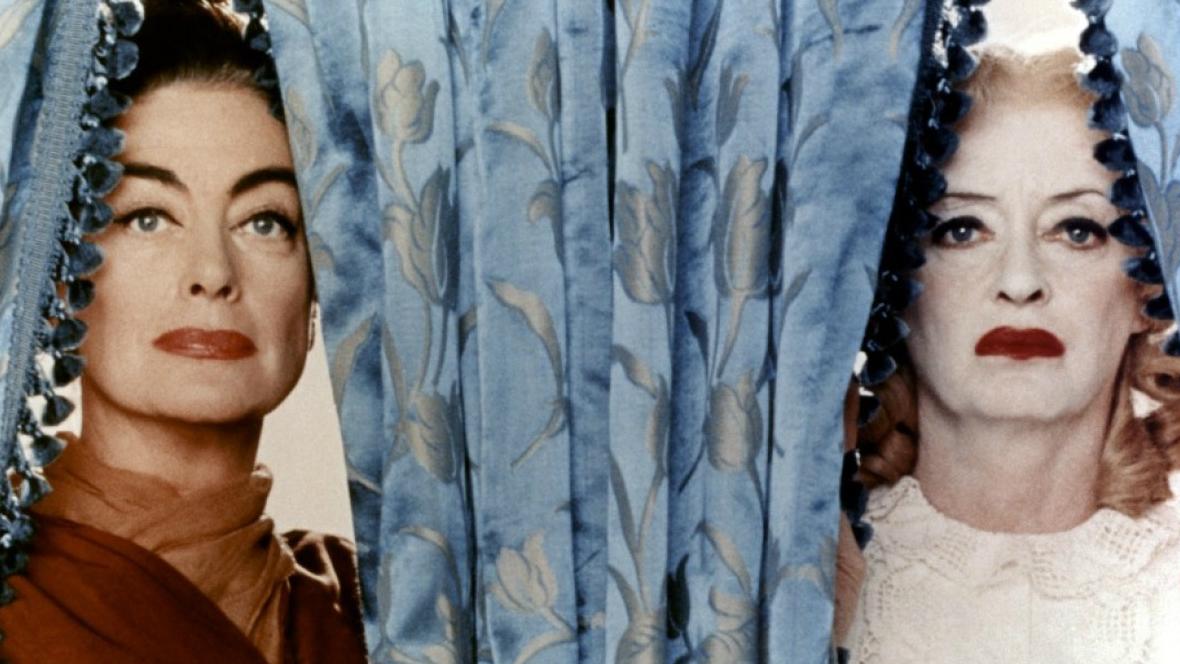FEUD: BETTE AND JOAN
Television now has allowed itself to tell one story, briefly, without a desire to go on for several seasons. Feud: Bette and Joan is in the tradition of another Ryan Murphy production, American Horror Story, in that every season will tackle another subject (next season, it will be the feud between His Royal Highness Charles, Prince of Wales, and his first wife, the late Lady Diana Spencer. Still no plans as of this writing to tackle Olivia de Havilland/Joan Fontaine feud. All's the pity).
Bette and Joan chronicles the war between Bette Davis (Susan Sarandon) and Joan Crawford (Murphy muse Jessica Lange) primarily centered around the making of the only film they made together: What Ever Happened to Baby Jane?. We see how these two divas undercut each other in ways large and small, both during the production and the follow-up, Hush...Hush, Sweet Charlotte (which Crawford pulled out of through less-than-straightforward, unable to endure another round with Davis). It's a well-produced limited series, with standout performances by Lange, Sarandon, Alfred Molina as director Robert Aldrich, Stanley Tucci as Warner Brothers head Jack Warner, and Judy Davis as gossip maven Hedda Hopper.
Curiously enough, the war between Hopper and her fellow gossip maven Louella Parsons might make for a good Feud season, their rivalry already covered in a television movie, Malice in Wonderland.
I say well acted, which it was, but I also was not convinced by Lange's portrayal of Crawford. Physically, Lange and the make-up crew did wonders to capture the Crawford look. Vocally, in all eight episodes of Bette and Joan, Lange never sounded like Crawford. There was a soft, breathy tone to her voice that didn't come close to what I remember of the real Crawford.
Much better was Sarandon as Davis. It wasn't an impersonation, but Sarandon got the short, clipped manner to Davis. Molina was a delight as the forever put-upon Aldrich, having to deal with power-mad moguls and temperamental divas making his life eternally miserable. Davis was all acid as Hopper, frenemy to Crawford. I think Tucci wasn't spot-on as the tyrannical Warner, the last of the great movie moguls, but when it came to Hollywood, Feud really is more about how it is today than how it was yesterday.
Feud is not just a tale of two women locked in a lifelong war that went on beyond the grave (Davis, outliving Crawford by more than a decade, still bitched about her long after Joan's body was a-moldering in the grave). It's also about the relatively low position women have in Hollywood. Warner at first doesn't want to hire Crawford and/or Davis for anything. First, both of them gave him endless trouble when working for Warner Brothers (Davis more than Crawford, but both insufferable to him). Second, he considers both of them, women in their fifties, would appeal to audiences.
Warner coldly dismissed them both due to their ability to arouse him sexually.
There's more than poetry in that idea, as today very few actresses past forty have both box office and 'sex' appeal. Meryl Streep is a rare example, but today's Hollywood, like the one that saw Crawford and Davis relegated to has-beens, does not go out of its way to hire actresses of a certain age. As I've pointed out, in the past decade the Best Actress Oscar winner has been on the young side (ironically, Streep pushes the average age up), while the Best Actor winner tends to be older. The youngest Best Actor winner this decade is actually older or the same age as five Best Actress winners.
Older actresses (say 50+) are not given major parts in big films. It is more than ageism, though that cannot be dismissed. It is because Hollywood today is reluctant to make films that would require older actresses. Today's Hollywood is more focused on comic book adaptations, franchise building, and the foreign market (particularly the Chinese market) to care about Sharon Stone, Julia Roberts, or Meg Ryan.
Think on that versus older actors like Jeff Bridges or Kurt Russell, who still appear in blockbusters.
In More, Or Less, we saw what was true then is true now: behind the scenes, it has not improved. Female directors are still rare, female writers still struggle harder. One character speculated that by the 1970s, studios would be forced to hire more female directors and writers because there would be more women. What was not seen was that the studio would respond to population growth, but not that of women, but of young boys.
If women were the economic powerhouse that it was thought they might be, would we really have the Marvel Cinematic Universe or its poor relation, the DC Extended Universe? Would we have The Fast & The Furious franchise (which came about virtually by accident)? Perhaps the latter: F&F has wide appeal through all races and genders, but it is more male-centered than female.
Even in more female-centric films and television, they tend to be closer to what might appeal to men: gone are the days of Loretta Young, sweeping in wearing elegant gowns on her anthology show. Now it's women like Chelsea Handler and Amy Schumer, women who've built their careers on being as raunchy, even vulgar as any of their male counterparts might be.
I doubt anyone who watches Handler, Schumer, or Samantha Bee would imagine them wearing gowns and reveling in the glories of femininity. Part of it is the change in society, which equates equality with similarity. I've long argued that men and women are equal, but are not the same. As such, things that might have mattered to Davis and especially Crawford: good parts where they could be strong women without being female versions of men, do not matter to those who are now en vogue in Hollywood.
Women are still not employed in larger numbers as directors or writers, let alone in the business office. So long as this continues, films will continue to go where the market is, and the market is in two places: China and the boys middle-school locker room.
Feud, in a sharp way, uses the past to illustrate the present. Women in front of the camera still struggle to get parts if they are past their child-bearing years (will people like Jennifer Lawrence or Emma Stone really go on to play Chekov on film once they get to be Sharon Stone's age?). The desire a woman may have to write and/or direct will still face a harder struggle than a man might.
Even if a man did get his film done, like Aldrich he might find himself having to constantly battle with studios who won't back his own vision and want to 'improve' on things, usually but not always with disastrous results.
The more things change...
Feud: Bette and Joan has so much going for it. It has great acting, writing and directing. It has nods to other projects like the Crawford biopic Mommie Dearest. It gives us sometimes sympathetic portraits of Davis and Crawford, two women who despite protests to the contrary were far more similar than different. It also has much to say, in a subtle way, about how things are now versus how things were then: the gimmicks, the struggles for things large (Oscar campaigns) and small (order of billing). It's not a bitchy slap-fest of two old broads (though we have good old-fashioned sniping), but a well-crafted production about how something unique emerged out of a lifelong antagonism between two legendary actresses.


No comments:
Post a Comment
Views are always welcome, but I would ask that no vulgarity be used. Any posts that contain foul language or are bigoted in any way will not be posted.
Thank you.